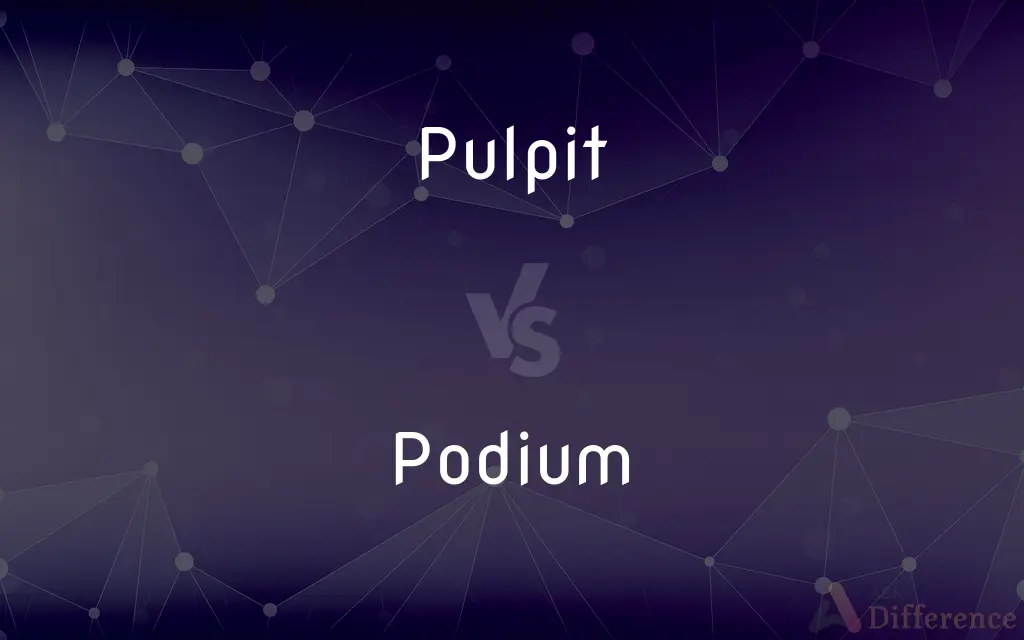Pulpit vs. Podium — What's the Difference?
By Fiza Rafique & Urooj Arif — Updated on April 23, 2024
Pulpit is a raised platform used in preaching or conducting a worship service, often found in churches, whereas a podium is a platform used to elevate the speaker in various types of events, such as conferences or sports ceremonies.

Difference Between Pulpit and Podium
Table of Contents
ADVERTISEMENT
Key Differences
Pulpits are specifically designed for religious contexts, typically used by clergy to deliver sermons within a church setting. Whereas, podiums are versatile platforms used in various secular events for speakers, ranging from academic presentations to award ceremonies.
Pulpits often feature elaborate designs that may include religious symbols and are usually made of wood. On the other hand, podiums are more utilitarian in design, focusing on functionality and may be made from a variety of materials, including wood, metal, or plastic.
In many churches, the pulpit is a permanent fixture, emphasizing its importance in worship. Whereas, podiums are often portable and can be moved or adjusted according to the needs of different events.
The location of a pulpit within a church is traditionally at the front, facing the congregation, symbolizing the authority of the clergy and the centrality of the sermon. On the other hand, podiums can be placed in various locations within a venue, depending on the layout and the type of event.
While the pulpit is used primarily for delivering sermons and conducting liturgical services, podiums serve a broader range of uses, including speeches at conferences, hosting panels, and conducting ceremonies.
ADVERTISEMENT
Comparison Chart
Primary Use
Religious sermons and services
Various speaking events
Design
Often elaborate with religious motifs
Utilitarian, focusing on practical use
Material
Predominantly wood
Wood, metal, plastic, etc.
Location
Fixed at the front of a church
Flexible, varies with venue
Symbolism
Represents religious authority
Represents a speaking authority
Compare with Definitions
Pulpit
A raised platform or lectern in a church from which the preacher delivers a sermon.
The minister approached the pulpit with a solemn expression.
Podium
A platform used to raise something to a short height, especially a person standing.
The speaker stepped onto the podium to address the crowd.
Pulpit
The enclosed or elevated area in a church occupied by the clergy and choir.
The choir gathered around the pulpit to sing the hymnal.
Podium
Typically less ornate than pulpits and designed for functionality.
The portable podium was set up quickly for the guest speaker.
Pulpit
Often an ornately carved fixture, emphasizing its importance and sacredness.
The antique pulpit was intricately carved with biblical scenes.
Podium
Used in various speaking events like conferences, debates, or sports ceremonies.
Winners at the sports event were awarded on the podium.
Pulpit
A stand used by preachers for support of the Bible and notes during sermons.
He placed his notes on the pulpit before beginning his sermon.
Podium
Can be moved or adjusted to suit the needs of the event.
The crew adjusted the height of the podium for the next speaker.
Pulpit
A symbol of religious authority within many Christian denominations.
The congregation directed their attention to the pulpit as the service began.
Podium
Serves as a focal point in events outside of religious contexts.
All eyes were on the podium as the keynote address was about to begin.
Pulpit
A pulpit is a raised stand for preachers in a Christian church. The origin of the word is the Latin pulpitum (platform or staging).
Podium
A podium (plural podiums or podia) is a platform used to raise something to a short distance above its surroundings. It derives from the Greek πόδι (foot).
Pulpit
A raised enclosed platform in a church or chapel from which the preacher delivers a sermon
Many ministers delivered political guidance from their pulpits
Podium
An elevated platform, as for an orchestra conductor or public speaker.
Pulpit
A raised platform in the bows of a fishing boat or whaler.
Podium
A stand for holding the notes of a public speaker; a lectern.
Pulpit
An elevated platform, lectern, or stand used in preaching or conducting a religious service.
Podium
A low wall serving as a foundation.
Pulpit
Clerics considered as a group.
Podium
A wall circling the arena of an ancient amphitheater.
Pulpit
The ministry of preaching.
Podium
(Biology) A structure resembling or functioning as a foot.
Pulpit
An elevated metal guardrail extending around the bow or stern of a yacht or other small vessel.
Podium
To complete a competition, especially a race, as one of the top three contestants, usually being honored while standing on a podium.
Pulpit
An elevated platform, such as one used by harpooners in a whaling boat.
Podium
A platform on which to stand, as when conducting an orchestra or preaching at a pulpit; any low platform or dais.
Pulpit
A bully pulpit.
Podium
(sometimes proscribed) A stand used to hold notes when speaking publicly.
Pulpit
A raised platform in a church, usually enclosed, where the minister or preacher stands when giving the sermon.
Podium
A steepled platform upon which the three competitors with the best results may stand when being handed their medals or prize.
Pulpit
Activity performed from a church pulpit, in other words, preaching, sermons, religious teaching, the preaching profession, preachers collectively or an individual preaching position; by extension: bully pulpit.
Podium
(sports) A result amongst the best three at a competition.
Pulpit
A raised desk, lectern, or platform for an orator or public speaker.
Podium
A low wall, serving as a foundation, a substructure, or a terrace wall.
Pulpit
(nautical) The railing at the bow of a boat, which sometimes extends past the deck. It is sometimes referred to as bow pulpit. The railing at the stern of the boat is sometimes referred to as a stern pulpit; other texts use the term pushpit.
Podium
The dwarf wall surrounding the arena of an amphitheatre, from the top of which the seats began.
Pulpit
A bow platform for harpooning.
Podium
The masonry under the stylobate of a temple, sometimes a mere foundation, sometimes containing chambers.
Pulpit
A plane's cockpit.
Podium
A foot or footstalk.
Pulpit
An elevated place, or inclosed stage, in a church, in which the clergyman stands while preaching.
I stand like a clerk in my pulpit.
Podium
To finish in the top three at an event or competition.
The swimmer podiumed three times at the Olympics.
Pulpit
The whole body of the clergy; preachers as a class; also, preaching.
I say the pulpit (in the sober useOf its legitimate, peculiar powers)Must stand acknowledged, while the world shall stand,The most important and effectual guard,Support, and ornament of virtue's cause.
Podium
A low wall, serving as a foundation, a substructure, or a terrace wall.
Pulpit
A desk, or platform, for an orator or public speaker.
Podium
The foot.
Pulpit
Of or pertaining to the pulpit, or preaching; as, a pulpit orator; pulpit eloquence.
Podium
A platform raised above the surrounding level to give prominence to the person on it
Pulpit
A platform raised above the surrounding level to give prominence to the person on it
Common Curiosities
What is the main purpose of a pulpit?
A pulpit is primarily used for delivering sermons and religious teachings within a church.
What are the common materials used for making pulpits?
Pulpits are most commonly made from wood, often featuring detailed carvings and religious symbols.
Can a podium be used in a religious context?
Yes, podiums can be used in religious contexts, especially in interfaith or community events not specific to worship.
What symbolic meaning does a pulpit carry in a church?
The pulpit symbolizes religious authority and the centrality of the Word in worship.
How does the positioning of pulpits and podiums differ?
Pulpits are usually positioned at the front and center of a church, facing the congregation, while podiums can be placed variably depending on the event layout.
Do podiums have any religious significance?
Generally, podiums do not carry religious significance and are used more for their functional value in speaking events.
Are podiums portable?
Many podiums are designed to be portable, allowing flexibility in various event settings.
Can the same structure be used as both a pulpit and a podium?
While they serve different primary functions, a simple structure could potentially be used as both, depending on the context.
Are there any restrictions on who can use a pulpit?
In many religious traditions, only ordained clergy may preach from the pulpit.
How do pulpits and podiums differ in terms of design?
Pulpits often have an ornate design reflecting their religious significance, whereas podiums are generally more focused on practicality.
Is there a difference in the audience interaction between a pulpit and a podium?
Pulpits typically facilitate a more formal and structured form of communication, as seen in religious services, while podiums may be used in a variety of interactive settings.
Why are pulpits often made of wood?
Wood is chosen for its durability and the ease with which it can be carved with ornate designs appropriate for a sacred setting.
How does the use of a podium enhance a speaker's presence?
A podium elevates the speaker to make them more visible and audible to the audience, enhancing communication.
What makes a podium suitable for various types of events?
Its versatility and adaptability in design and placement make it suitable for a wide range of events beyond religious contexts.
What is the typical height of a podium compared to a pulpit?
Both are raised platforms, but the exact height can vary depending on the design and purpose.
Share Your Discovery

Previous Comparison
Horse vs. Mare
Next Comparison
Overall vs. GeneralAuthor Spotlight
Written by
Fiza RafiqueFiza Rafique is a skilled content writer at AskDifference.com, where she meticulously refines and enhances written pieces. Drawing from her vast editorial expertise, Fiza ensures clarity, accuracy, and precision in every article. Passionate about language, she continually seeks to elevate the quality of content for readers worldwide.
Co-written by
Urooj ArifUrooj is a skilled content writer at Ask Difference, known for her exceptional ability to simplify complex topics into engaging and informative content. With a passion for research and a flair for clear, concise writing, she consistently delivers articles that resonate with our diverse audience.
















































